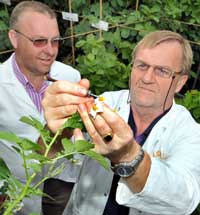Crop protection projects handed £13.5m boost

Thirty-two applied crop protection research projects have been awarded £13.5m of government funding, the Technology Strategy Board has announced.
The projects will aim to develop technologies to help growers adapt to the specific challenges posed by recent changes to EU pesticide regulations that threaten the withdrawal of a number of key crop protection products.
It also supports the broader aims of the Technology Strategy Board.
The board is a business-led executive non-departmental public body established by the government and sponsored by the Department for Business, Innovation and Skills, under its recently established Sustainable Agriculture and Food Innovation Platform (SAF IP).
“The platform aims to bring government, business and researchers together to stimulate the development of new technologies that will increase food productivity, while decreasing the environmental impact of the food and farming industries,” explained Iain Gray, chief executive of TSB.
Projects have been awarded funding from TSB, DEFRA and the Biotechnology and Biological Sciences Research Council, the Scottish government and the Agricultural and Horticultural Development Board.
The projects include one attempting to identify and map weeds and their densities, to allow precise weed control, and another trying to breed wheat varieties that are less dependent on pesticides for optimal yields.
More than half of the projects are aimed at helping either potato growers or the horticultural sector, which has been hit hard by the new pesticide legislation.
Projects include Berry Gardens Growers’ research into developing biofumigant products to control verticillium wilt in strawberries, which could be applied in other crops, and development of strategies to control cabbage root fly on radish and internal rots in onions.
The main focus of the potato research appears to be trying to find alternatives to nematicides, with Cygnet Potato Breeders leading research to develop new varieties with resistance to tobacco rattle virus, while Barrier Biotech is looking to produce nematicides based on plant oil formulations.
In total, taking into account contributions from British firms undertaking the research, the total value of research is in excess of £25m, TSB says.
Up to £90m will be invested by TSB over the next five years across the agri-food sector, with future competitions focusing on sustainable livestock production and the reduction of food chain waste and greenhouse gas emissions.

